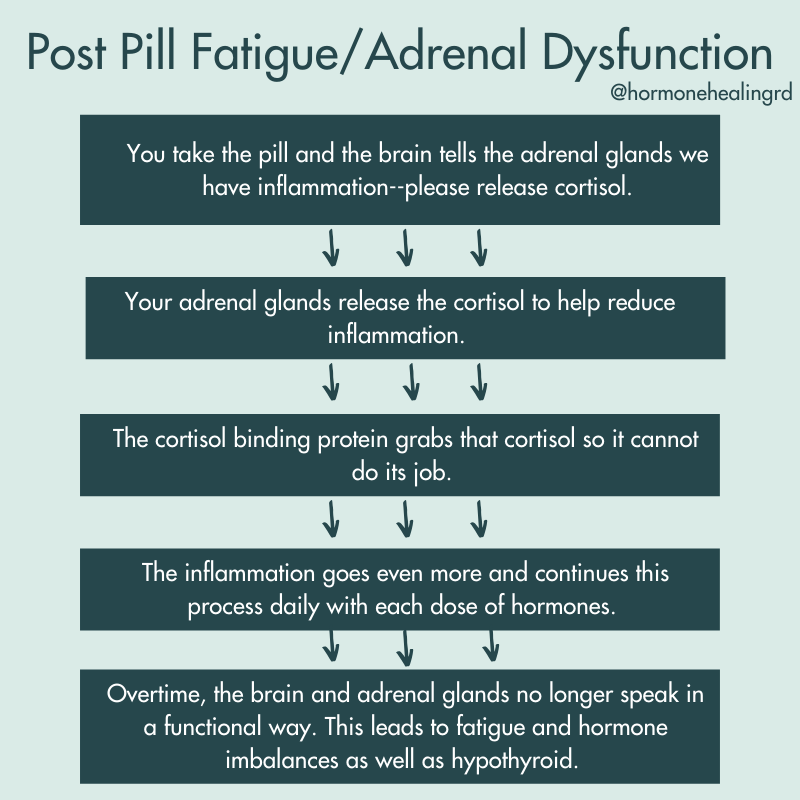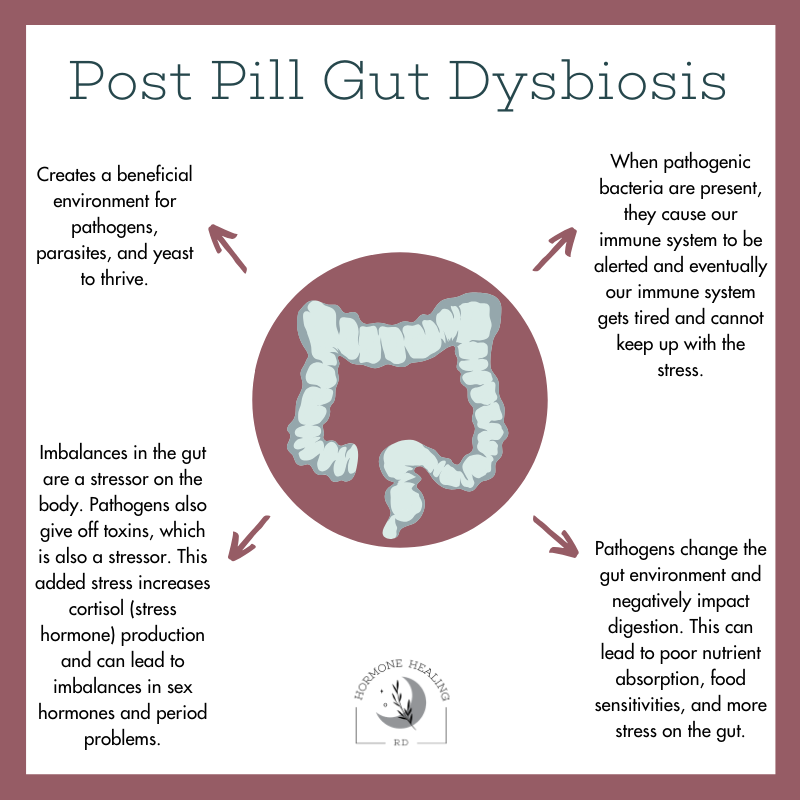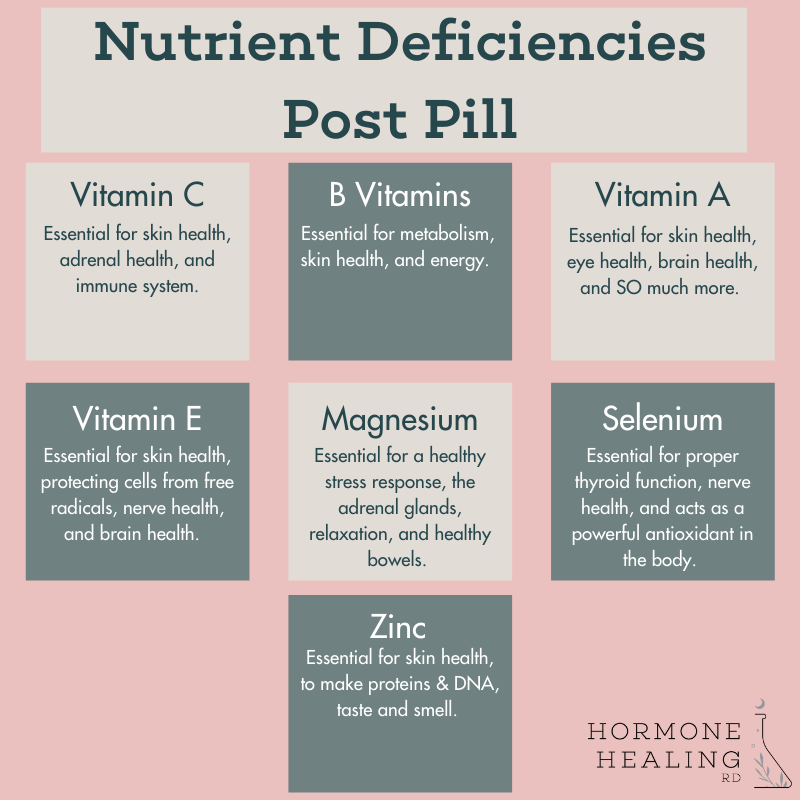Are you nervous about getting off the pill or having an IUD removed? I get it. I’ve been there. Unfortunately, I didn’t have the knowledge that I have now when I came off the pill.
This led to me not getting a period for 10 months, developing Post Pill PCOS, and completely changed the trajectory of my life and career.
You might be freaked out about getting off the pill or getting your IUD out, but once you reconnect with your body’s natural cycles and regain your sanity it will be SO worth it.
In order to transition off of hormonal birth control with minimal side effects and to regain your menstrual cycle there are four main areas you want to focus on:
I’m going to walk you through each area and share tips you can discuss with your doctor before transitioning off. I also want to mention that you can apply these to support your body while you continue to use hormonal birth control as well.
The pill is a chronic, low grade stressor on the body and when we stop taking it, we need to make sure we are supporting a healthy stress response.
How does the pill cause stress? The influx of hormones on a daily basis leads to a stress cascade in the body.
Here’s how works:
Your brain get’s alerted to stress, tells the adrenal glands there’s inflammation, and then cortisol is released.
This happens over and over and eventually the brain and adrenal glands no longer speak in a functional way.
This is what leads to post pill fatigue. Along with gut imbalances, possible thyroid issues, and nutrient deficiencies.
If/when you decide to transition off the pill, I always recommend taking that week off from intense exercise, sleeping as much as you can, and avoiding added stress as much as possible. Having daily stress management practices that you use is helpful for long term hormone health as well.

When we come off the pill we eventually start to make our own hormones again. This means your liver is working extra hard to completely process out all of the hormones from the pill/IUD as well as your own hormone production.
Hormonal birth control also depletes certain nutrients that our liver needs to function properly.
Supporting your liver with lemon water with added chlorophyll is a great way to do this gently. Start with 1 tsp and work your way up to 1 tbsp per day.
The pill causes dysbiosis or an imbalance of bacteria in your gut. This creates a beneficial environment for pathogens, parasites, and yeast to thrive.
These pathogens/yeast/etc.cause your immune system to become activated. If left unaddressed, your immune system eventually down-regulates, making you more susceptible to further overgrowth and infections.
This dysfunction in the gut leads to poor digestion and absorption, food sensitivities, and more stress on the body, which makes it VERY difficult to balance your hormones.

Rebalancing Gut Bacteria
Prebiotic Rich Foods
If you have digestive issues like constipation, bloating, loose stools, or indigestion, I recommend avoiding too many probiotic-rich foods and to cook your veggies. This will make the digestive process much easier. Adding in foods like bone broth is very helpful too!
The pill has been shown to deplete specific nutrients in the body such as magnesium, B vitamins especially folate and B12, vitamin C and E, selenium, and zinc.
I recommend using a grass-fed Beef Liver supplement like a multivitamin to help replenish many of these lost nutrients. Whole food form

Magnesium:
B Vitamins:
Vitamin C:
Vitamin E:
Selenium:
Zinc:
If you want to learn more about how hormonal birth control like the pill impacts the body and what you can do about it, I highly recommend picking up a copy of Beyond the Pill by Dr. Jolene Brighten. She’s amazing, the book is packed with information, and if you need a practitioner to help walk you through it, test your hormones and gut health, and support you, I’m here!
I also believe that every woman should own a copy of The Period Repair Manual by Lara Briden. Not only is there helpful information about all of the different types of birth control, but there is also troubleshooting for different hormonal imbalances and period problems.
To learn how to best support your body during this stressful time through HTMA testing and an individualized approach, check out our Master Your Minerals course! In it, we teach you how to build a hormone-healing protocol based on your unique HTMA results.
Q: What other options/methods are there for birth control?
A: Here’s a great article that highlights 6 alternative methods to hormonal birth control. I prefer the Fertility Awareness Method (FAM) paired with condom or diaphragm use during your fertile days (which there actually aren’t that many of). Want to learn more about FAM? Fertility Friday is my favorite resource and she has an awesome podcast that is free and packed with helpful information.
Q: What’s a natural form of birth control?
A: The Fertility Awareness Method or FAM is the most natural form of birth control and it allows you to get in tune with your body. I use a tempdrop to monitor my basal body temperature and look for an increase that shows ovulation has occurred. Tracking cervical mucus tells you if you are in a fertile phase, basal body temp confirms ovulation. Fertility Friday has a book and course on this. Taking Charge of Your Fertility is the book I used to learn the method.
Q: Any advice for pill-induced PCOS?
A: Pill-induced PCOS is typically temporary. With this specific type of PCOS, you typically have a higher ratio of luteinizing hormone (LH) to follicle-stimulating hormone (FSH), which is why you want to avoid supplements like Vitex (can make things worse). First, I recommend getting your FSH and LH tested. If your ratio is high, you can take a combination of peony and licorice to help rebalance your pituitary. Make sure you take them first thing in the morning before breakfast since this is when your pituitary is most receptive.
Q: Why is my period so heavy since stopping hormonal birth control?
A: In this situation, I would want to think about if your period was heavy prior to starting the pill. If so, you have to remember that the pill doesn’t balance your hormones or fix your period problems. It is a bandaid that masks them, which means when you get off they will likely be present and often exacerbated.
Another consideration is estrogen dominance. Often when we get off HBC we will have an increase in estrogen. Heavy periods are often common in pill-induced PCOS (see above). Low progesterone also leads to this. The only way we make progesterone is through ovulation and when we don’t ovulate on the pill. I recommend giving your body some time to adjust. If things don’t improve, make an appointment with your doctor to have your hormones tested.
Q: How long will it take to get my period back? Since getting off the pill, it’s gone!
A: It can take on average 3-9 months, but for some women up to a year. I discussed this a bit above, but you also want to think about if your cycle were normal prior to starting the pill. If not, then you likely still have some dysfunction occurring post-pill. If they were regular, then your body may need some more time. Regardless, make sure you follow the recommendations I outlined above for nutrient replenishment, gut health, liver detox, and stress.
Q: What’s the best way to supplement while taking hormonal birth control?
A: You can follow the same nutrition and supplement recommendations I went through above.
References:
Nutrient Depletion:
Gut Dysbiosis:
Thyroid & Adrenal Function:
